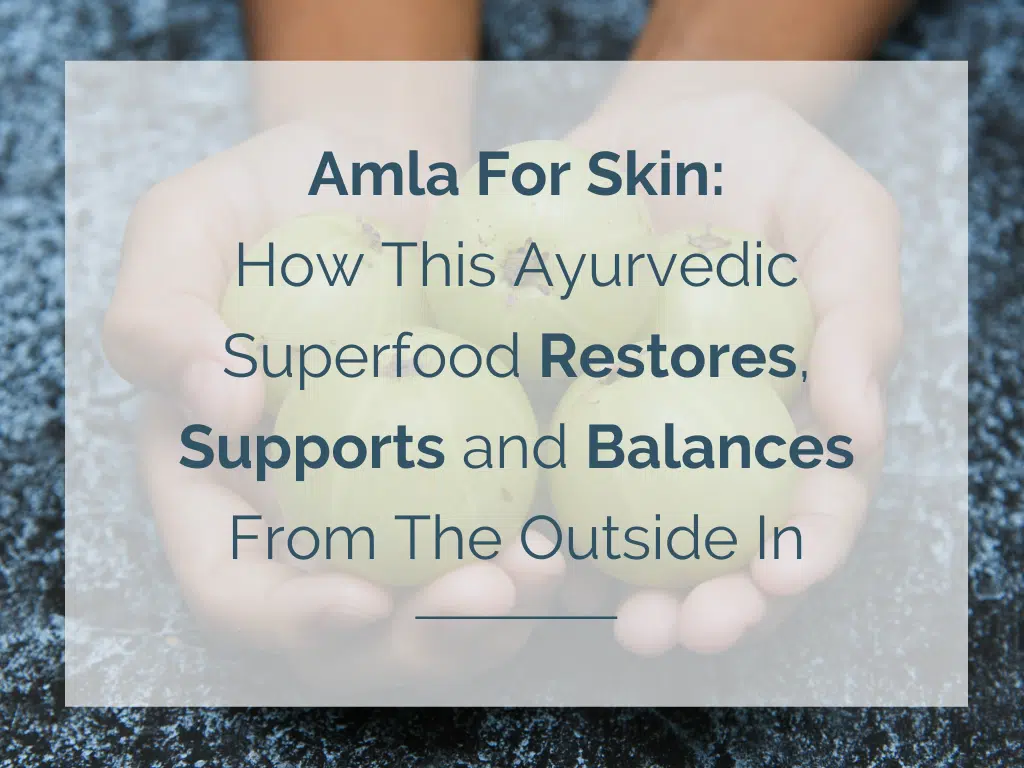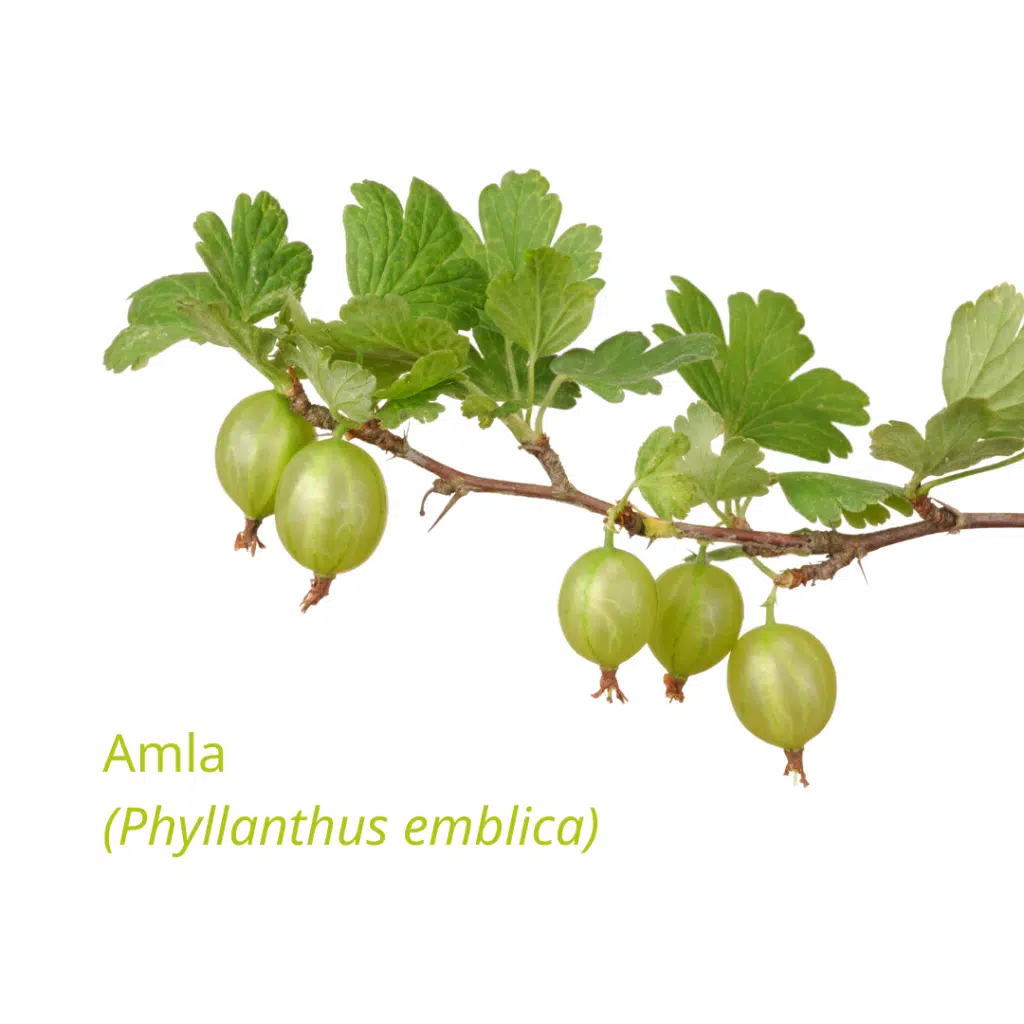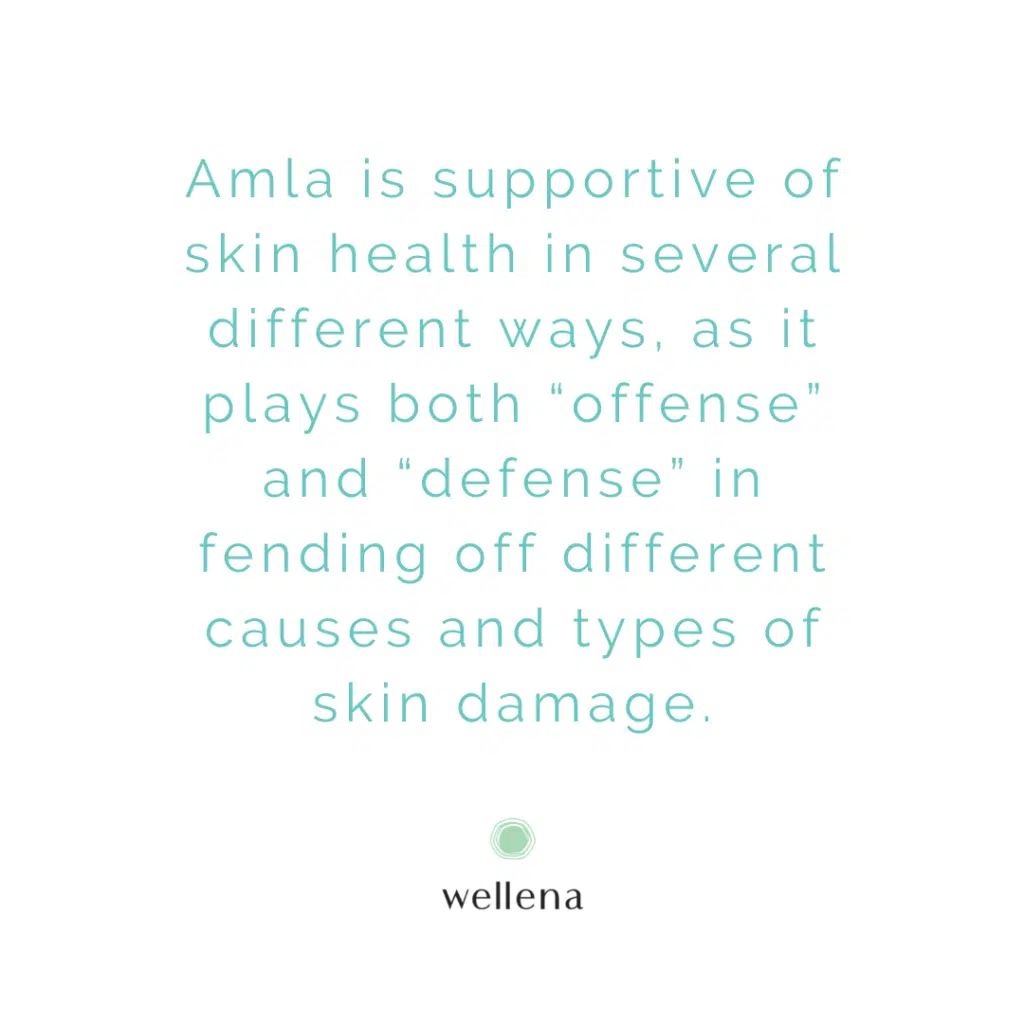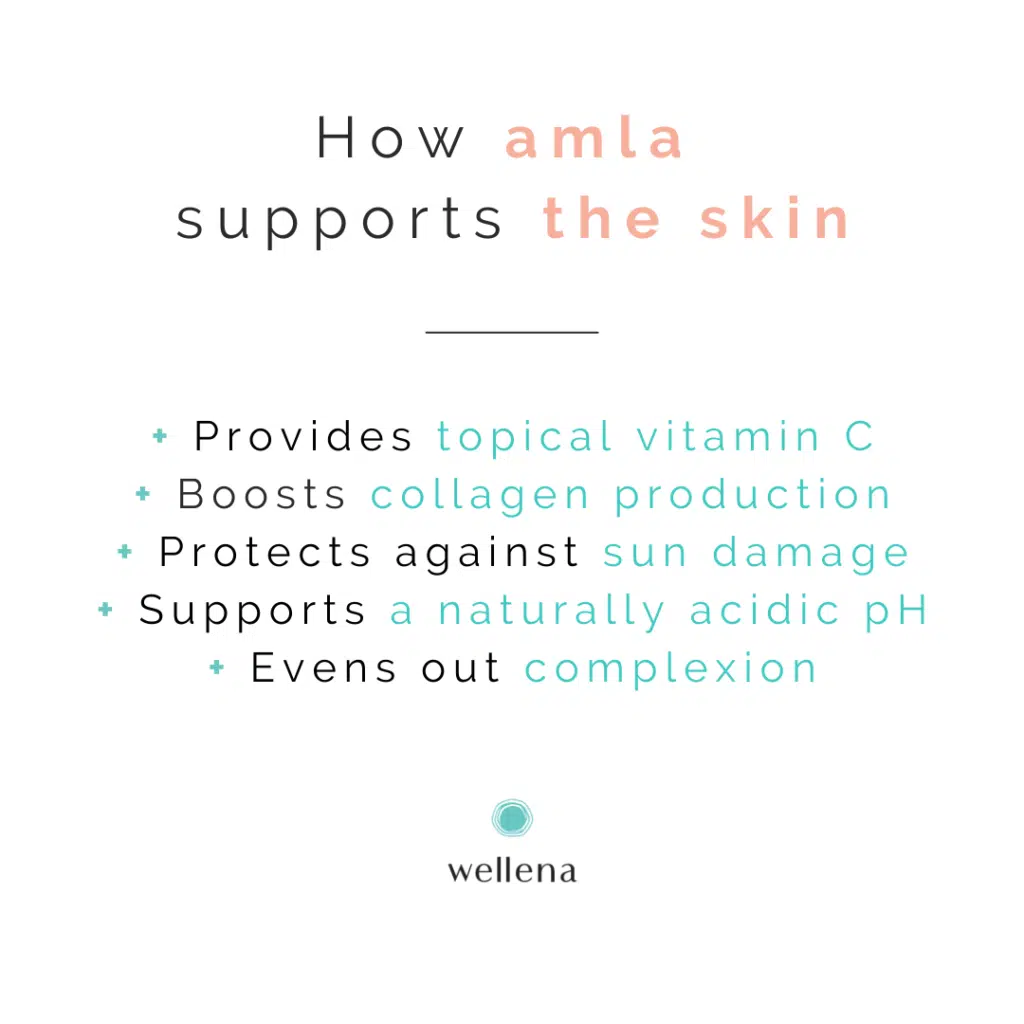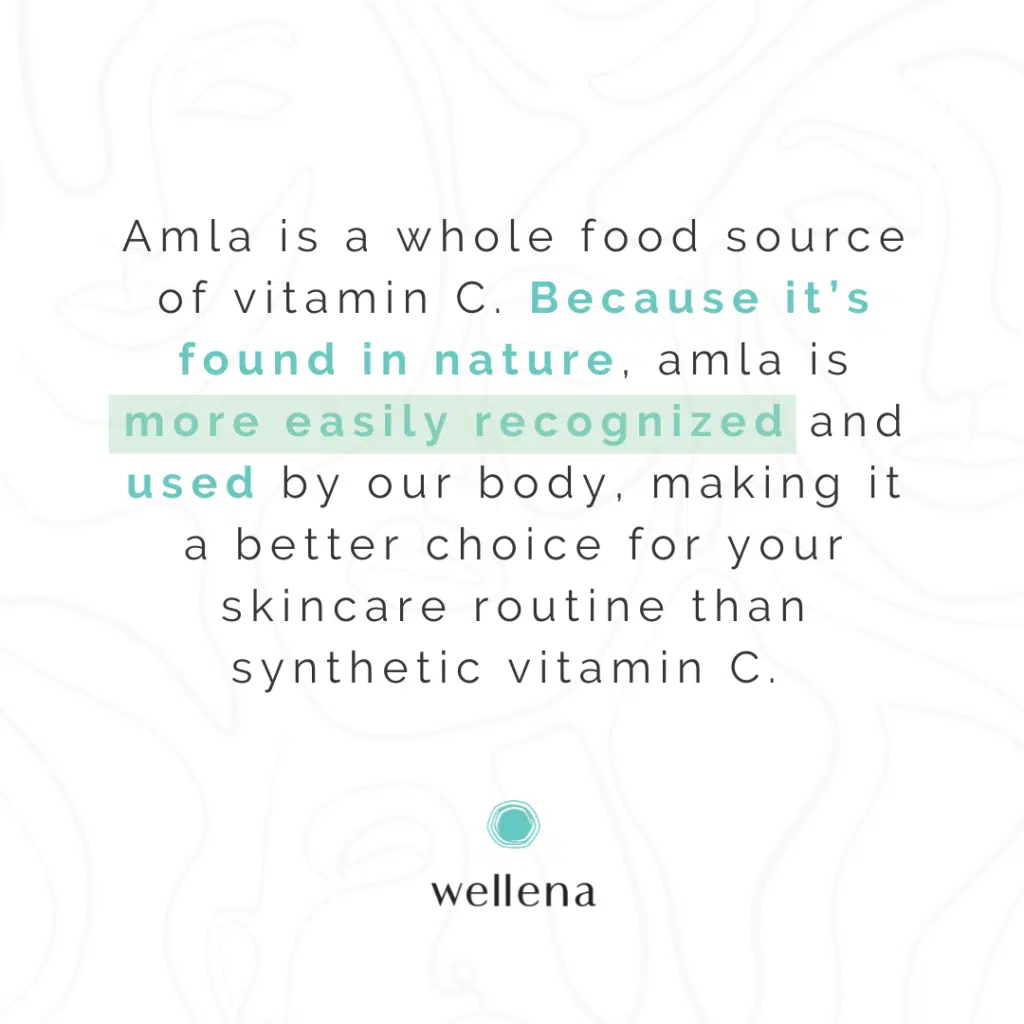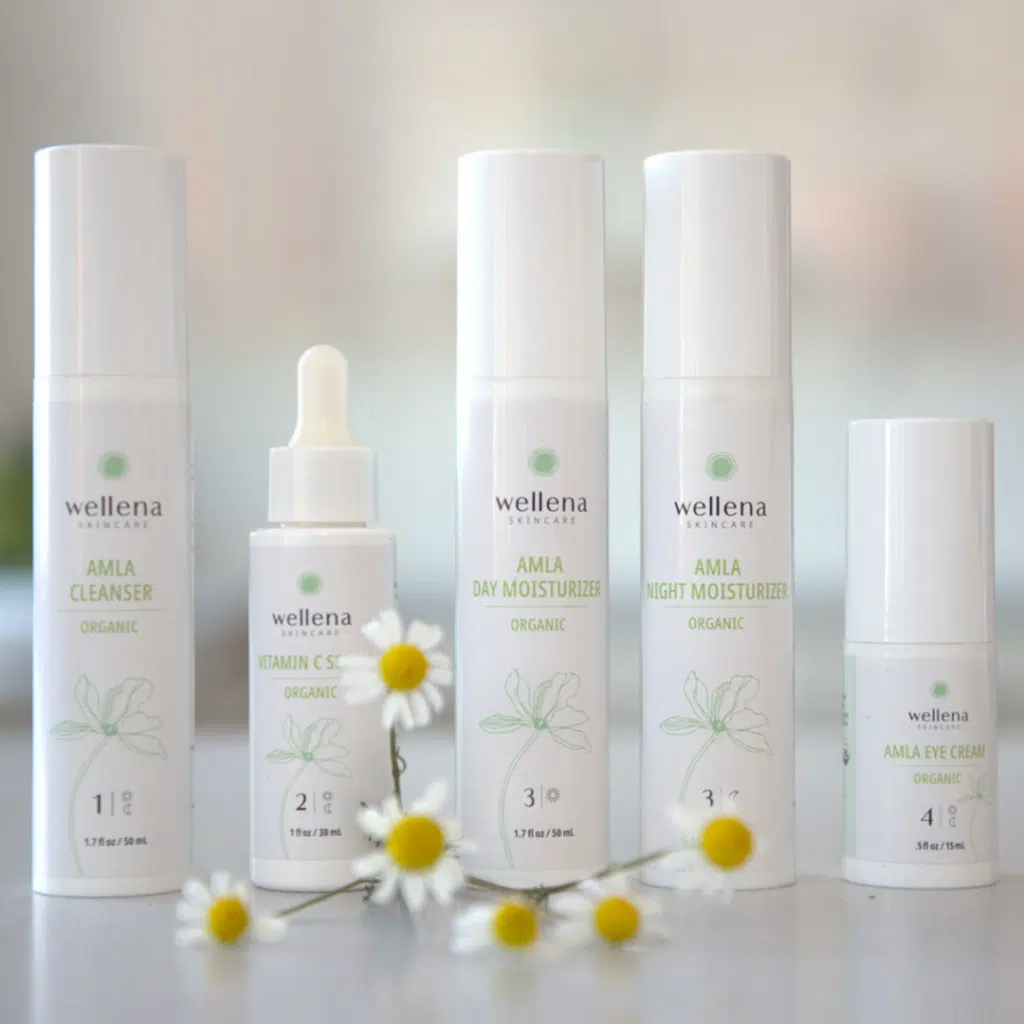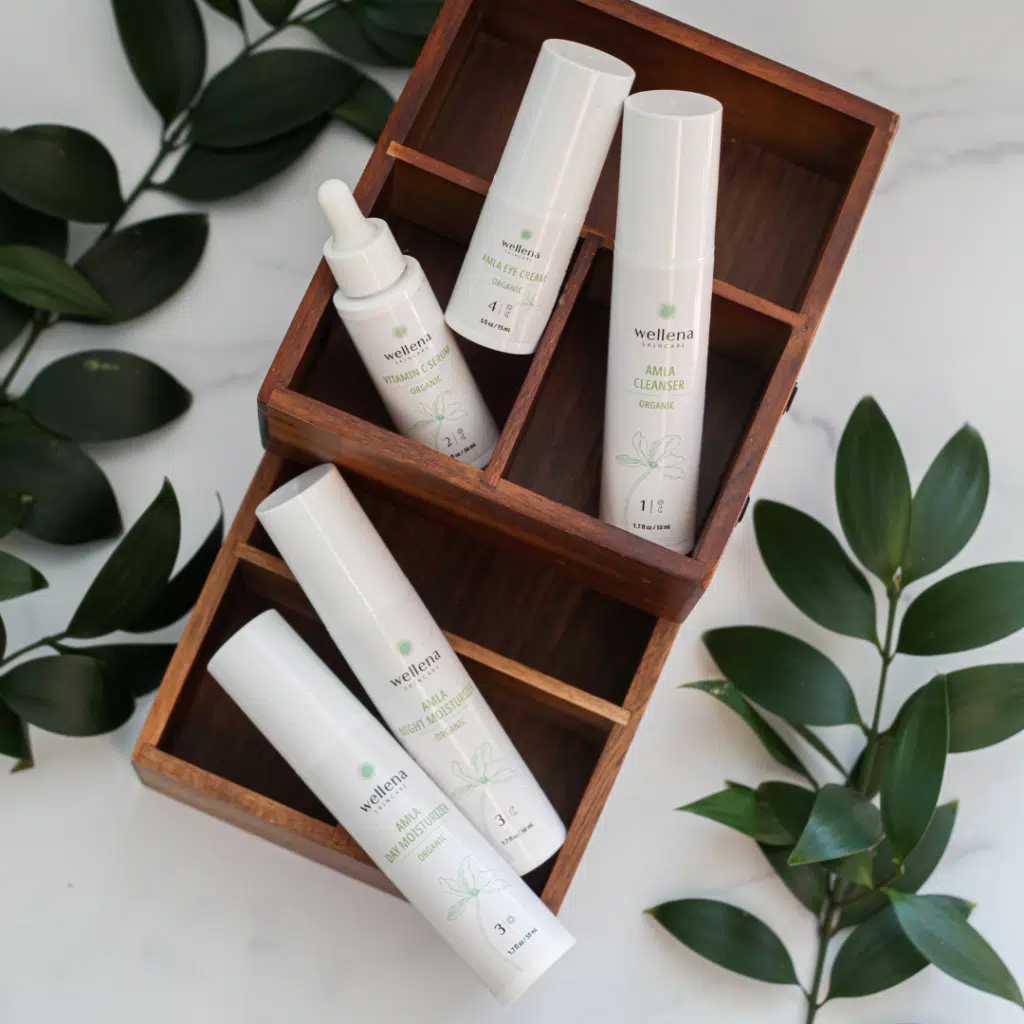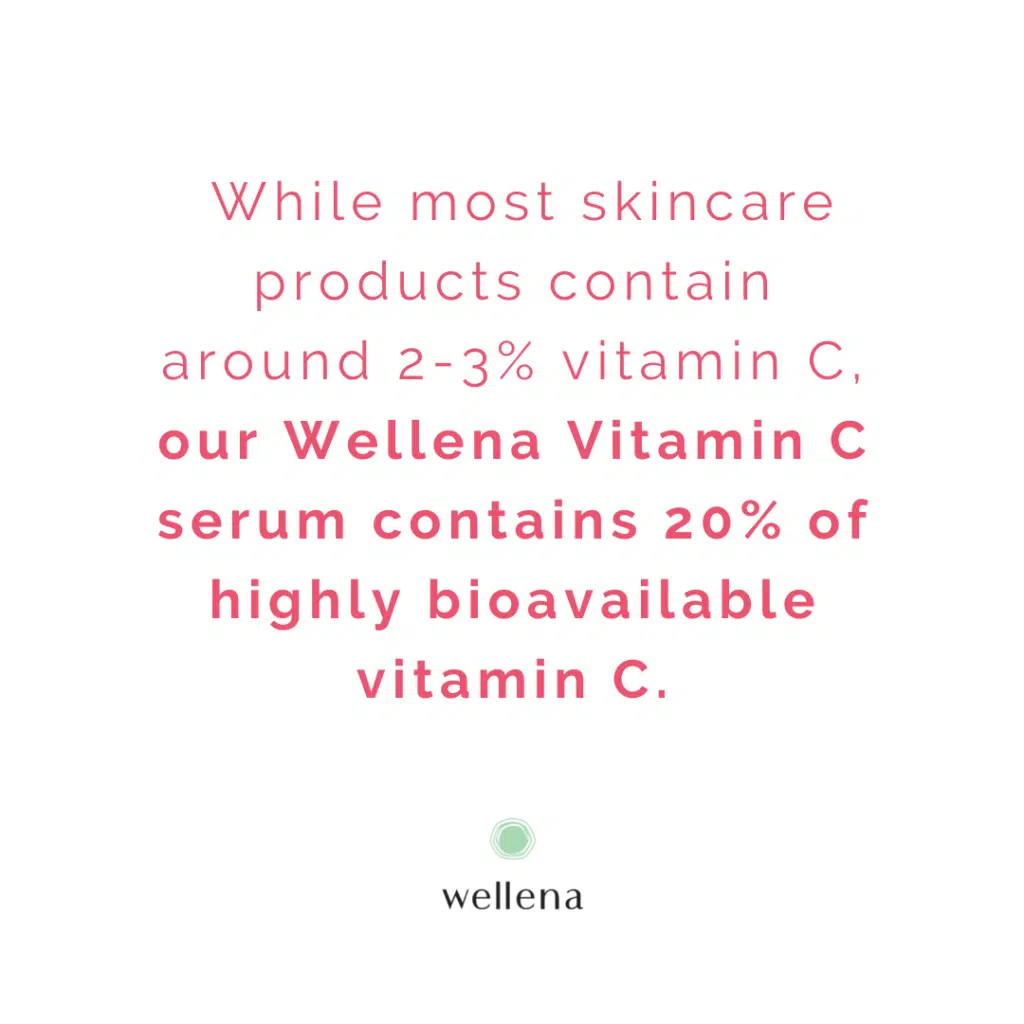What You Will Learn in This Article
- What is amla?
- Benefits of amla
- How amla naturally supports the skin
- Benefits of amla over synthetic vitamin c for skincare
- How to use our Amla skincare line
If you’ve been noticing your skin isn’t as clear, smooth, or even as you’d like, an Ayurvedic medicinal food, amla, just may be the skincare superfood you’ve been waiting for.
Many of you may be familiar with the Wellena skincare line, introduced in early 2020. Our USDA certified organic skincare products are based on the skin-nourishing benefits of the vitamin C-rich superfood, Amla.
This article is one of a series highlighting the ingredients of our Wellena skincare products. Introducing our first skincare highlight: Ayurvedic superfood, Amla.
What is Amla?
Amla (Latin: Emblica officinalis Gaertn. or Phyllanthus emblica Linn) is also known as Indian gooseberry. It’s a popular Ayurvedic botanical that is widely acclaimed for its extremely high Vitamin C content. (1)
Depending on how ripe the berries are, amla can have a vitamin C content of anywhere from 560 to 800 milligrams per 100 grams of berries. On average, the amount is 600 milligrams of vitamin C per 100-gram serving. Amla has traditionally been used internally for colds and digestive issues and externally for the skin. (2)
Often referred to as a “superfood,” whole amla berries are used in jellies & jams, chutneys, fruit salads, candies, and are even sometimes pickled. They’re also dried and powdered for use in smoothies and made into dietary supplements. The powder and extract are used in skincare products.
Benefits of Amla
Amla is a botanical that has benefits for the whole body, both inside and out. Here are a few of its systemic benefits:
Lowers Inflammation
Because it’s so high in anti-inflammatory vitamin C, amla can help to lower inflammation — from the inside out, or the outside in.
In one study of 64 obese patients with diabetes or high blood pressure, those in the experimental group were given 500 mg of vitamin C twice a day. At the end of the 8-week study, they had significantly reduced inflammatory markers compared to the control group who did not receive the vitamin C, including a lower C-reactive protein score. (3)
In a study of cancer patients, vitamin C was given intravenously (through an IV) at a clinic. The IV-appropriate dosages were from 7.5 grams up to 50 grams. The IV vitamin C was found to help reduce markers of inflammation in the majority of patients. (4)
Amla itself has also been studied for inflammation – as a potential replacement for ongoing non-steroidal anti-inflammatory drug (NSAID) use. In an animal study, amla extract was comparable to an arthritis medication in its ability to lower inflammation. Researchers found that this was likely due to its phenolic compounds, including quercetin, rutin, gallic acid, and ellagic acid. (5)
The fact that amla and vitamin C can lower inflammation also shows positive effects on the immune system.
How Amla Naturally Supports the Skin
Amla is supportive of skin health in several different ways, as it plays both “offense” and “defense” in fending off different causes and types of skin damage.
Provides Topical Vitamin C
Amla is a great source of the antioxidant vitamin C. Some of the benefits of applying vitamin C topically include decreasing redness and evening out skin tone. It’s used in dermatology for exactly that.
Poor diet and lifestyle can set off an inflammatory marker called nuclear transcription factor kappa B (NFkB), which contributes to inflamed skin. Vitamin C inhibits NFkB, which may also improve conditions of inflamed skin like acne and rosacea. (6)
Boosts Collagen Production
Amla helps you age gracefully due to its ability to boost collagen production. You probably know that collagen levels go down with age. That’s what leads to the fine lines and wrinkles, sagging skin, uneven skin tone, and lovely bags under our eyes that make us look forever unrested. (7)
While we can’t avoid aging altogether, we can slow it down, so that we age much more gracefully. That’s where vitamin C can help — both internally and topically. Vitamin C stimulates the synthesis of collagen in the skin, plumping it up and making it look softer and fuller. (8)
In one study, a topical cream that was 5% vitamin C helped to reconstitute collagen within the skin. It significantly improved skin structure, softening it, reducing wrinkles, adding hydration, and brightening the appearance. (9) As you will read further down, the Wellena skincare line is formulated with a whopping 20% vitamin C.
Provides Antioxidants to the Skin
Because amla is highly concentrated in vitamin C, it provides antioxidant protection directly to the skin. Antioxidants prevent the oxidation or “rusting” that occurs from exposure to free radicals and natural aging. An example of this is what happens to a cut apple when it’s exposed to air. As time passes, the apple will go from a white flesh to brown. To prevent this, people will often sprinkle some lemon juice on this apple. Lemon is also high in antioxidant vitamin C. Putting amla on the skin works in a similar way: protecting the skin against oxidation from free radicals.
Protects Against Sun Damage
Amla has also been shown in human skin cells studies to protect against sun damage from Ultraviolet B (UVB) radiation. It helps you to age gracefully by lessening the damage caused by sunlight exposure. This also helps you to spend adequate time in the sun for your vitamin D levels, while still protecting the skin cells from the sun’s negative effects. (10)
Supports a Naturally Acidic pH
Amla contains a few different fruit tannins which give it astringent properties. (11) The fact that amla is an astringent is another way it helps the skin. It serves as a toner that helps balance the pH of the skin (making it more acidic), which helps maintain its natural skin microbiome.
Healthy skin tends to stay in a pH range of 4.5 to 5.0. According to research, a pH value below 5.0 makes for healthier, more hydrated skin. It also promotes a microbiome-friendly environment, which helps you maintain your skin’s natural flora with beauty-supporting effects. (12)
You can read more about how hormone changes impact the pH of your skin by reading this article.
Evens Out Complexion – Dark Spots
Because it has so many skin-supporting qualities (antioxidant, lightening skin, promoting collagen), vitamin C has been studied to see if it could reduce the “age spots” we tend to develop as the years pass by.
Melanin is a naturally occurring pigment in our skin that increases with exposure to the sun. In research, topical vitamin C was found to inhibit melanin production, which then decreased pigmentation and the look of “age spots.” (13)
Benefits of Amla Over Synthetic Vitamin C for Skincare
As mentioned, amla is a whole food source of vitamin C. Because it’s found in nature, amla is more easily recognized by our body. It’s considered “bioavailable,” which means that it’s ready to be used by the body.
How to Use Our Amla Skincare Line
Our Wellena skincare line is a USDA-certified organic lineup of products featuring amla.
It also includes natural emollients and moisturizers combined with geranium and bergamot essential oils for an uplifting—yet light and natural—fragrance. Some of the benefits of using our amla-based skincare products are the following:
- Extremely high in vitamin C
- Helps in the production of collagen
- Provides overnight hydration
- Anti-inflammatory effects, cellular repair
- Soothing for the skin
- Emollient, deeply moisturizing
- Gluten-free
- Non-GMO
- No toxic preservatives
- No parabens
- No hydrogenated oils
- No artificial colors or fragrance
- USDA organic certified
The skincare line has all the basics for your daily skincare routine, helping you to cleanse, nourish, and repair your skin from morning to night.
The Amla Complete Kit has all 5 amla products:
- Amla Cleanser
- Vitamin C Serum
- Amla Day Moisturizer
- Amla Night Moisturizer
- Amla Eye Cream
The kit includes products for both your morning routine and your bedtime routine.
Morning
In the morning, start with the Amla Cleanser. Gentle and effective, our gel cleanser boasts high concentrations of antioxidant vitamin C, thanks to the superfruit amla. An organic soap derived from soap nuts provides gentle cleansing without stripping the skin of its natural oils. This cleanser is completely free of irritants, sulfates, or harsh chemicals.
Next, apply some of the Vitamin C Serum. Your skin will soak up the major antioxidant and anti-inflammatory effects of vitamin C in this serum, which comes from both amla and camu camu. Scented with soothing chamomile oil and other plant extracts and oils, like geranium and bergamot, this serum glides on smoothly, and a single drop goes a long way. While most skincare products contain around 2-3% vitamin C, our Wellena Vitamin C serum contains 20% of highly bioavailable vitamin C.
Finish with our Amla Day Moisturizer. This formula provides all-day hydration and protection due to deeply penetrating mango seed butter and vitamin C from amla. It leaves your skin fresh and glowing, helping you to start the day looking your very best.
Evening
After a fulfilling day, wet your face with a warm, damp washcloth and then apply the Amla Cleanser. Make sure to remove all makeup, so that your skin is ready to soak up the soothing amla moisturizer.
Amla Night Moisturizer: Loaded with rich hydration, this formulation increases skin elasticity and firmness, removes puffiness under the eyes, and reduces fine lines and wrinkles. It’s an uber-nourishing nightly treatment.
Treat your skin to the gentle yet powerful benefits of the botanical superfood amla with our complete kit. Buy your complete kit now and save $23.
Resources
- Baliga, M. S. et al. Amla (Emblica officinalis Gaertn), a wonder berry in the… : European Journal of Cancer Prevention. European Journal of Cancer Prevention. May 2011.
- Nashine, Sonali et al. “Nutraceutical effects of Emblicaofficinalis in age-related macular degeneration.” Aging. 2019.
- Ellulu, Mohammed S et al. “Effect of vitamin C on inflammation and metabolic markers in hypertensive and/or diabetic obese adults: a randomized controlled trial.” Drug design, development and therapy. July 2015,
- Mikirova, Nina et al. “Effect of high-dose intravenous vitamin C on inflammation in cancer patients.” Journal of translational medicine. September 2012.
- Middha, Sushil Kumar et al. “Toxicological Evaluation of Emblica officinalis Fruit Extract and its Anti-inflammatory and Free Radical Scavenging Properties.” Pharmacognosy magazine. 2015.
- Telang, Pumori Saokar. “Vitamin C in dermatology.” Indian dermatology online journal. 2013.
- Varani, James et al. “Decreased collagen production in chronologically aged skin: roles of age-dependent alteration in fibroblast function and defective mechanical stimulation.” The American journal of pathology. 2006.
- Aguirre, Rene, and James M May. “Inflammation in the vascular bed: importance of vitamin C.” Pharmacology & therapeutics. 2008.
- Crisan, Diana et al. “The role of vitamin C in pushing back the boundaries of skin aging: an ultrasonographic approach.” Clinical, cosmetic and investigational dermatology. September 2015,
- Adil, Mushtaq D et al. “Effect of Emblica officinalis (fruit) against UVB-induced photo-aging in human skin fibroblasts.” Journal of ethnopharmacology. 2010.
- Bhat, P. M., Umale, H. & Lahankar, M. Amalaki: A review on functional and pharmacological properties. Journal of Pharmacognosy & Phytochemistry. 2019.
- Lambers, H et al. “Natural skin surface pH is on average below 5, which is beneficial for its resident flora.” International journal of cosmetic science. 2006.
- Al-Niaimi, Firas, and Nicole Yi Zhen Chiang. “Topical Vitamin C and the Skin: Mechanisms of Action and Clinical Applications.” The Journal of clinical and aesthetic dermatology. 2017.
